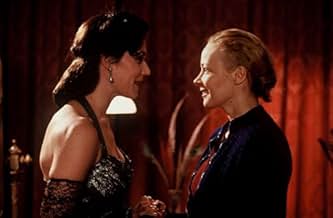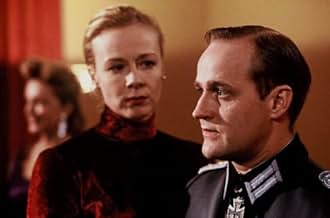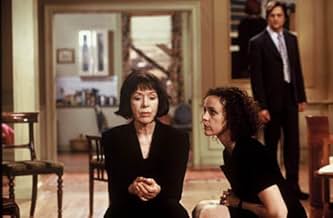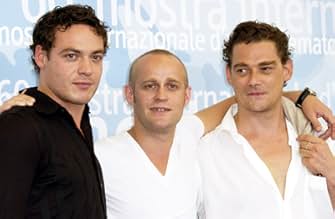AVALIAÇÃO DA IMDb
6,7/10
2,6 mil
SUA AVALIAÇÃO
Adicionar um enredo no seu idiomaAfter the death of her father, Hannah becomes concerned with the strange behavior of her mother. As her mother's troubled childhood is revealed, Hannah realizes how little she ever knew.After the death of her father, Hannah becomes concerned with the strange behavior of her mother. As her mother's troubled childhood is revealed, Hannah realizes how little she ever knew.After the death of her father, Hannah becomes concerned with the strange behavior of her mother. As her mother's troubled childhood is revealed, Hannah realizes how little she ever knew.
- Direção
- Roteiristas
- Artistas
- Prêmios
- 9 vitórias e 3 indicações no total
- Direção
- Roteiristas
- Elenco e equipe completos
- Produção, bilheteria e muito mais no IMDbPro
Avaliações em destaque
Film is a cultural product more or less reflecting the trend of a time. Thus, I was made alert when I was watching this slow-tuned movie. Why in such a sudden in the past few years, movies like "Rosenstraße" depicting the humane behaviour of the Germans at wartime mushroom? "The Pianist", "Der Untergang" join the rally.
People may say, "Time heals!" "We need to do justice to the German". True, true, true, doubtlessly, there must have been German citizens who were holding opposing ideas against the Nazi government's. There must be kind-hearted and righteous Germans who protected Jewish people and later got persecuted by their own people. And there is a need to make movies reflecting the true historical facts. These films are 100% not party or government propaganda. My concern here is "timing". Tellingly, why didn't these movies come up in the 70's, 80's or 90's? But early 21st Century when the Neo-Nazi is rising quietly bit by bit today in Germany. I cannot but easily associate these movies to what is really happening in this country.
People may say, "Time heals!" "We need to do justice to the German". True, true, true, doubtlessly, there must have been German citizens who were holding opposing ideas against the Nazi government's. There must be kind-hearted and righteous Germans who protected Jewish people and later got persecuted by their own people. And there is a need to make movies reflecting the true historical facts. These films are 100% not party or government propaganda. My concern here is "timing". Tellingly, why didn't these movies come up in the 70's, 80's or 90's? But early 21st Century when the Neo-Nazi is rising quietly bit by bit today in Germany. I cannot but easily associate these movies to what is really happening in this country.
One thing that astonished me about this film (and not in a good way) was that Nathan Stoltzfus, who seems to pride himself on being the major historian on the topic of the Rosenstrasse, was one of the historians working on this film, considering how much of the actual events were altered or disregarded.
Another reviewer said that von Trotta said she never meant for Lena to bed Goebbels, but in that case, why did she give every impression that that was what had happened? Why not show other possible reasons for the mens' release, such as the disaster that was Stalingrad, or the Nazis' fear that the international press, based in Berlin, would find out about the protest.
Also, why did the whole storyline play second fiddle to a weak family bonding storyline that has been done over and over again? Surely something as awesome as this could carry its own history! In places, it was as if the film had two story lines that really seemed to have little in common.
Overall, this film failed in its aim, which was to draw attention to a little-known act of resistance, which is a shame, because done better, it could have had a major impact.
Another reviewer said that von Trotta said she never meant for Lena to bed Goebbels, but in that case, why did she give every impression that that was what had happened? Why not show other possible reasons for the mens' release, such as the disaster that was Stalingrad, or the Nazis' fear that the international press, based in Berlin, would find out about the protest.
Also, why did the whole storyline play second fiddle to a weak family bonding storyline that has been done over and over again? Surely something as awesome as this could carry its own history! In places, it was as if the film had two story lines that really seemed to have little in common.
Overall, this film failed in its aim, which was to draw attention to a little-known act of resistance, which is a shame, because done better, it could have had a major impact.
Berlin-born in 1942 Margarethe von Trotta was an actress and now she is a very important director and writer. She has been described, perhaps even unfairly caricatured, as a director whose commitment to bringing a woman's sensibility to the screen outweighs her artistic strengths. "Rosenstrasse," which has garnered mixed and even strange reviews (the New York Times article was one of the most negatively aggressive reviews I've ever read in that paper) is not a perfect film. It is a fine movie and a testament to a rare coalescing of successful opposition to the genocidal Nazi regime by, of all peoples, generically powerless Germans demonstrating in a Berlin street.
Co-writer von Trotta uses the actual Rosenstrasse incident in the context of a young woman's search for information about her mother's never disclosed life as a child in the German capital during World War II.
The husband of Ruth Weinstein (Jutta Lampe) has died and in a surprising reversion to an orthodox Jewish lifestyle apparently hitherto in long abeyance, Ruth not only "sits shivah" (the Jews' week-long mourning ritual) but she insists on following the strict proscriptions of her faith. Her apartment in New York City reflects the affluence secured by her deceased spouse's labors. Her American-born daughter, Hannah (Maria Schrader) and her brother are a bit put-off by mom's assumption of restrictive orthodox Jewish practices but they pitch in. The mother coldly rejects the presence of Hannah's fiance, a non-Jew named Luis (Fedja van Huet). A domestic crisis might well erupt as Ruth warns that she'll disown Hannah if she doesn't give up doting, handsome Luis. Stay tuned.
A cousin arrives to pay her respects and also drops clues to an interested Hannah about a wartime mystery about mom's childhood in Berlin. Hannah is intrigued - she queries her mom who resolutely refuses to discuss that part of her life. This is very, very realistic. I grew up with parents who fled Nazi Germany just in time and I knew many children whose families, in whole but usually in part, escaped the Holocaust. Those days were simply not discussed.
So Hannah, having learned that a German gentile woman saved Ruth's life, traipses off to Berlin hoping to find the savior still breathing. Were she not, this would have been a very short film. But Ruth, pretending to be a historian, locates 90 year-old Lena Fischer (Doris Schade), now a widow. As the happy-to-be-interviewed but shaken up by repressed memories Lena tells her story, the scenes shift fairly seamlessly between present day Berlin and the war-time capital.
The young Lena of 1943 (Katja Riemann) was a fine pianist married to a Jewish violinist, Fabian Fischer (Martin Feifel). With the advent of the Nazi regime he was required to use "Israel" as a middle name just as Jewish women had to add "Sarah" to their names(incidentally I wish IMDb had not given Fabian's name on its characters list with the false "Israel" included-it simply perpetuates a name applied by Nazis as a mark of classification and degradation).
While Germany deported most of its Jewish population to concentration camps, those married to "Aryans" were exempted. For a time. Until 1943 when the regime decided to take them too (most were men; a minority were Jewish women married to non-Jews). The roundup is shown here in all its frightening intensity.
The young Lena tries to locate her husband. All she and many other women know is that they're confined in a building on Rosenstrasse. The crowd of anxious women builds up, some piteously seeking help from German officers who predictably refuse aid and also verbally abuse them ("Jew-loving whore" being one appellation). As a subplot Lena more or less adopts eight-year-old Ruth who hid when her mother was seized (remember, Ruth is now sitting shiva in Manhattan). The child Ruth is fetchingly portrayed by Svea Lohde.
Through increasingly angry protestations the women finally prevail. The men, and a handful of women, are released. As in the real story the Nazis gave in, one of the rare, almost unprecedented times when the madmen acknowledged defeat in their homicidal agenda (another was the termination of the euthanasia campaign to rid the Reich of mental defectives and chronic invalids but that's another story).
Von Trotta builds up the tension and each woman's story is both personal and universal. Hannah continues to prod the aging Lena who slowly, one gathers, begins to suspect she's not dealing with an ordinary historian but rather someone with a need to learn about the girl she rescued, the child whose mother was murdered.
The contrasts between Rosenstrasse of 1943, a set, and the street today in a bustling, rebuilt, unified Berlin provide a recurring thematic element. Today's Berlin bears the heritage but not the scars of a monstrous past. Von Trotta makes that point very well.
The main actors are uniformly impressive. Lena's husband while strong is also shown as totally helpless in the snare of confinement with a likely outlook of deportation (which is shown to have been clearly understood by all characters - including the local police and military - as a one-way trip to oblivion). The older Ruth is catalytically forced to confront demons long suppressed in her happy New York life. Hannah is very believable as a young woman whose father's death triggers a need to discover her family's past. These things happen (although the Times's critic appears not to know that).
Von Trotta's hand is sure but not perfect. A scene with Goebbels at a soiree enjoying Lena's violin playing is unnecessary and distractive. The suggestion that she may have gone to bed with the propaganda minister, the most fanatical top-level Hitler worshiper, to save her husband detracts from the wondrous accomplishment of the demonstrating spouses and relatives. Most of the German officers come from central casting and are molded by the Erich von Stroheim "copy and paste" school of Teutonic nastiness. But that's understandable.
The Rosenstrasse story has been the subject of books and articles and some claim it's a paradigm case for arguing that many more Jews could have been saved had more Germans protested. Unfortunately that argument is nonsense. The German women who occupied Rosenstrasse were deeply and understandably self-interested. Most Germans were located on a line somewhere between passive and virulent anti-Semitism. THAT'S why the Rosenstrasse protest was virtually singular. Whether one buys or rejects the Goldenhagen thesis that most Germans were willing accomplices of the actual murderers it just can not be denied that pre-Nazi endemic anti-Semitism erupted into a virulent strain from 1933 on.
The elderly Lena remarks that what was accomplished by the women was "a ray of light" in an evil time. Most of the men and women sprung from a near death trip survived the war. So "a ray of light" it was and von Trotta's movie is a beacon of illumination showing that some were saved by the courage of largely ordinary women and for every life saved an occasion for celebration exists. And always will.
9/10
Co-writer von Trotta uses the actual Rosenstrasse incident in the context of a young woman's search for information about her mother's never disclosed life as a child in the German capital during World War II.
The husband of Ruth Weinstein (Jutta Lampe) has died and in a surprising reversion to an orthodox Jewish lifestyle apparently hitherto in long abeyance, Ruth not only "sits shivah" (the Jews' week-long mourning ritual) but she insists on following the strict proscriptions of her faith. Her apartment in New York City reflects the affluence secured by her deceased spouse's labors. Her American-born daughter, Hannah (Maria Schrader) and her brother are a bit put-off by mom's assumption of restrictive orthodox Jewish practices but they pitch in. The mother coldly rejects the presence of Hannah's fiance, a non-Jew named Luis (Fedja van Huet). A domestic crisis might well erupt as Ruth warns that she'll disown Hannah if she doesn't give up doting, handsome Luis. Stay tuned.
A cousin arrives to pay her respects and also drops clues to an interested Hannah about a wartime mystery about mom's childhood in Berlin. Hannah is intrigued - she queries her mom who resolutely refuses to discuss that part of her life. This is very, very realistic. I grew up with parents who fled Nazi Germany just in time and I knew many children whose families, in whole but usually in part, escaped the Holocaust. Those days were simply not discussed.
So Hannah, having learned that a German gentile woman saved Ruth's life, traipses off to Berlin hoping to find the savior still breathing. Were she not, this would have been a very short film. But Ruth, pretending to be a historian, locates 90 year-old Lena Fischer (Doris Schade), now a widow. As the happy-to-be-interviewed but shaken up by repressed memories Lena tells her story, the scenes shift fairly seamlessly between present day Berlin and the war-time capital.
The young Lena of 1943 (Katja Riemann) was a fine pianist married to a Jewish violinist, Fabian Fischer (Martin Feifel). With the advent of the Nazi regime he was required to use "Israel" as a middle name just as Jewish women had to add "Sarah" to their names(incidentally I wish IMDb had not given Fabian's name on its characters list with the false "Israel" included-it simply perpetuates a name applied by Nazis as a mark of classification and degradation).
While Germany deported most of its Jewish population to concentration camps, those married to "Aryans" were exempted. For a time. Until 1943 when the regime decided to take them too (most were men; a minority were Jewish women married to non-Jews). The roundup is shown here in all its frightening intensity.
The young Lena tries to locate her husband. All she and many other women know is that they're confined in a building on Rosenstrasse. The crowd of anxious women builds up, some piteously seeking help from German officers who predictably refuse aid and also verbally abuse them ("Jew-loving whore" being one appellation). As a subplot Lena more or less adopts eight-year-old Ruth who hid when her mother was seized (remember, Ruth is now sitting shiva in Manhattan). The child Ruth is fetchingly portrayed by Svea Lohde.
Through increasingly angry protestations the women finally prevail. The men, and a handful of women, are released. As in the real story the Nazis gave in, one of the rare, almost unprecedented times when the madmen acknowledged defeat in their homicidal agenda (another was the termination of the euthanasia campaign to rid the Reich of mental defectives and chronic invalids but that's another story).
Von Trotta builds up the tension and each woman's story is both personal and universal. Hannah continues to prod the aging Lena who slowly, one gathers, begins to suspect she's not dealing with an ordinary historian but rather someone with a need to learn about the girl she rescued, the child whose mother was murdered.
The contrasts between Rosenstrasse of 1943, a set, and the street today in a bustling, rebuilt, unified Berlin provide a recurring thematic element. Today's Berlin bears the heritage but not the scars of a monstrous past. Von Trotta makes that point very well.
The main actors are uniformly impressive. Lena's husband while strong is also shown as totally helpless in the snare of confinement with a likely outlook of deportation (which is shown to have been clearly understood by all characters - including the local police and military - as a one-way trip to oblivion). The older Ruth is catalytically forced to confront demons long suppressed in her happy New York life. Hannah is very believable as a young woman whose father's death triggers a need to discover her family's past. These things happen (although the Times's critic appears not to know that).
Von Trotta's hand is sure but not perfect. A scene with Goebbels at a soiree enjoying Lena's violin playing is unnecessary and distractive. The suggestion that she may have gone to bed with the propaganda minister, the most fanatical top-level Hitler worshiper, to save her husband detracts from the wondrous accomplishment of the demonstrating spouses and relatives. Most of the German officers come from central casting and are molded by the Erich von Stroheim "copy and paste" school of Teutonic nastiness. But that's understandable.
The Rosenstrasse story has been the subject of books and articles and some claim it's a paradigm case for arguing that many more Jews could have been saved had more Germans protested. Unfortunately that argument is nonsense. The German women who occupied Rosenstrasse were deeply and understandably self-interested. Most Germans were located on a line somewhere between passive and virulent anti-Semitism. THAT'S why the Rosenstrasse protest was virtually singular. Whether one buys or rejects the Goldenhagen thesis that most Germans were willing accomplices of the actual murderers it just can not be denied that pre-Nazi endemic anti-Semitism erupted into a virulent strain from 1933 on.
The elderly Lena remarks that what was accomplished by the women was "a ray of light" in an evil time. Most of the men and women sprung from a near death trip survived the war. So "a ray of light" it was and von Trotta's movie is a beacon of illumination showing that some were saved by the courage of largely ordinary women and for every life saved an occasion for celebration exists. And always will.
9/10
I'm always surprised about how many times you'll see something about World War 2 on the German national television. You would think they don't like to open old wounds, but there isn't a week that goes by without a documentary or a movie about the horror and atrocities of this war. Perhaps it's a way of dealing with their past, I don't know, but you sure can't blame them of ignoring what happened. And it has to be said: most of those documentaries are really worth a watch because they never try to gloss over the truth and the same can be said about their movies (think for instance about "Der Untergang" or "The Downfall" as you might now it) which are also very realistic.
One of those movies is "Rosenstrasse". It tells a true story and deals with the subject of the mixed marriages during the war, even though the movie starts with a family in the USA, at the present day. After Hannah's father died, her mother all a sudden turned into an orthodox Jew even though she hasn't been very religious before. She doesn't know where the strange behavior of her mother comes from, but as she starts digging in her mother's troubled childhood, Hannah understands how little she has ever known about her mother's past.
The fact that this movie deals with the subject of the mixed marriages during the Nazi regime is already quite surprising. For as far as I know, there hasn't been another movie that deals with this subject. (For those who didn't know this yet: Being married to a so-called pure Aryian man or woman meant for many Jews that they weren't immediately sent to one of the concentration camps, but that they had to work in a factory). But it does not only tell something about the problems of the mixed marriages, it also gives a good idea of how these people were often seen by their own parents and relatives. How difficult it sometimes was for them during the Nazi regime and how these people, most of the time women, did everything within their power to free their men, once they were captured and locked away in for instance the Rosenstrasse...
The acting is really good and the story is very well written, although the way it was presented in the beginning didn't really do it for me (and that's exactly the only part that you'll get to see in the trailer). Perhaps it's just me, but I would have left out a big part of what happens in the present day. At least of the part that is situated in the USA, because the part where Hannah goes to Berlin and talks to someone who knows more about her mother's past, definitely works.
If you are interested in everything that has something to do with the Second World War, and if you aren't necessarily looking for a lot of action shots, than this is definitely a movie you should see. This isn't a movie in which you'll see any battles or gunfights, but it certainly is an interesting movie, because it gives you an idea about an aspect of the war only little is known of. I give it an 8/10.
One of those movies is "Rosenstrasse". It tells a true story and deals with the subject of the mixed marriages during the war, even though the movie starts with a family in the USA, at the present day. After Hannah's father died, her mother all a sudden turned into an orthodox Jew even though she hasn't been very religious before. She doesn't know where the strange behavior of her mother comes from, but as she starts digging in her mother's troubled childhood, Hannah understands how little she has ever known about her mother's past.
The fact that this movie deals with the subject of the mixed marriages during the Nazi regime is already quite surprising. For as far as I know, there hasn't been another movie that deals with this subject. (For those who didn't know this yet: Being married to a so-called pure Aryian man or woman meant for many Jews that they weren't immediately sent to one of the concentration camps, but that they had to work in a factory). But it does not only tell something about the problems of the mixed marriages, it also gives a good idea of how these people were often seen by their own parents and relatives. How difficult it sometimes was for them during the Nazi regime and how these people, most of the time women, did everything within their power to free their men, once they were captured and locked away in for instance the Rosenstrasse...
The acting is really good and the story is very well written, although the way it was presented in the beginning didn't really do it for me (and that's exactly the only part that you'll get to see in the trailer). Perhaps it's just me, but I would have left out a big part of what happens in the present day. At least of the part that is situated in the USA, because the part where Hannah goes to Berlin and talks to someone who knows more about her mother's past, definitely works.
If you are interested in everything that has something to do with the Second World War, and if you aren't necessarily looking for a lot of action shots, than this is definitely a movie you should see. This isn't a movie in which you'll see any battles or gunfights, but it certainly is an interesting movie, because it gives you an idea about an aspect of the war only little is known of. I give it an 8/10.
'A ray of light in hard times' - this is how one of the main heroines characterizes the events described in 'Rosenstrasse', the 2003 film directed by Margarethe von Trotta. The episode took place in February-March 1943 and was one of the few, if not the only, public protest in Nazi Germany against the deportation and extermination of the Jews. The demonstrations took place on Berlin's Roses Street (hence the name of the film) where hundreds of Jews who were to be deported to concentration and extermination camps were held in a former Jewish welfare center. They were organized by the non-Jewish wives of the arrested men, mixed couples having a special status in the context of the racial laws (the Nurenberg laws). This unique public display of solidarity with the Jewish population (albeit motivated by family ties) led to the release of about 1,800 Jews, most of whom survived the war. In German history, the episode is considered as proof that 'it could have been otherwise' and presented as one of the few moments of anti-Nazi civil resistance.
The screenplay (co-written by Margarethe von Trotta and Pamela Katz) is conceived as a journey into family history and rediscovery of identity that is undertaken more than 50 years after the war by Hannah Weinstein, a young Jewish New Yorker. Her mother, about whose biography the daughter knows very little, except that she came to the United States as a child after the war, seems to go through a crisis of identity radicalization, deciding to mourn her deceased husband according to the laws of Jewish orthodoxy and opposing vehemently Hannah's marriage to a young non-Jew. With the help of a cousin who came to her father's funeral, Hannah begins to retrace her mother's biography and discovers that the 8-year-old Jewish girl had been rescued and sheltered during the last years of the war by Lena Fischer, a woman descended from the German aristocracy, who in turn was married to a Jew. Lena still lives in Berlin, and Hannah will travel to meet her. From here, the story of the events in Rosenstrasse is reconstructed through flash-backs that visually translate the accounts of the woman who, almost 60 years ago, had participated in the protests to save her husband, had met and taken under her protection the Jewish girl, remained alone in the world after her mother's deportation.
Margarethe von Trotta is a multi-talented filmmaker - actress, screenwriter, director - who spent the first years of her career in the milieus of the French New Wave and then the German New Cinema, to establish herself in the following decades with films and roles in which she analyzes (especially) German history and brings into debate important figures and moments, some not without controversy. 'Rosenstrasse' is an important film in its very subject matter, but it is an uneven film in its achievement. The most powerful part seemed to me to be the individual stories that reconstruct destinies - many tragic - broken by war and the horrors of the Holocaust. It is the secondary characters, some of whom only appear in a scene or two, that have the best chance of remaining in the viewers' memory. The contemporary plot and especially the episodes set in America don't hold up as solidly and are based too much on stereotypes. As in all of the director's films, the prominent characters are women and the actresses are given the opportunity for solid roles. Maria Schrader (herself a remarkable director and actress) is excellent as the woman on a quest for the truth about her family history and her own identity. Katja Riemann and Doris Schade interpret the role of Lena at both ages with aplomb and dignity. I was less impressed by Jutta Lampe as the mother. The way her role is written does not clarify either her supposed identity crisis or the radical change that occurs towards the end. The episode of the flirtation with Goebbels, which would have led to the release of the prisoners, has been widely criticized, especially in Germany, because it appears to downplay the impact of the women's protests. I think these criticisms are justified, although it seems that, historically, it was indeed Goebbels who ordered the release of the prisoners. Franz Rath's cinematography differentiates the leaps into the past by shooting in gray and metallic shades, almost black and white. 'Rosenstrasse' remains an interesting and important film both for its subject matter and for the discussions it has generated and will continue to generate.
The screenplay (co-written by Margarethe von Trotta and Pamela Katz) is conceived as a journey into family history and rediscovery of identity that is undertaken more than 50 years after the war by Hannah Weinstein, a young Jewish New Yorker. Her mother, about whose biography the daughter knows very little, except that she came to the United States as a child after the war, seems to go through a crisis of identity radicalization, deciding to mourn her deceased husband according to the laws of Jewish orthodoxy and opposing vehemently Hannah's marriage to a young non-Jew. With the help of a cousin who came to her father's funeral, Hannah begins to retrace her mother's biography and discovers that the 8-year-old Jewish girl had been rescued and sheltered during the last years of the war by Lena Fischer, a woman descended from the German aristocracy, who in turn was married to a Jew. Lena still lives in Berlin, and Hannah will travel to meet her. From here, the story of the events in Rosenstrasse is reconstructed through flash-backs that visually translate the accounts of the woman who, almost 60 years ago, had participated in the protests to save her husband, had met and taken under her protection the Jewish girl, remained alone in the world after her mother's deportation.
Margarethe von Trotta is a multi-talented filmmaker - actress, screenwriter, director - who spent the first years of her career in the milieus of the French New Wave and then the German New Cinema, to establish herself in the following decades with films and roles in which she analyzes (especially) German history and brings into debate important figures and moments, some not without controversy. 'Rosenstrasse' is an important film in its very subject matter, but it is an uneven film in its achievement. The most powerful part seemed to me to be the individual stories that reconstruct destinies - many tragic - broken by war and the horrors of the Holocaust. It is the secondary characters, some of whom only appear in a scene or two, that have the best chance of remaining in the viewers' memory. The contemporary plot and especially the episodes set in America don't hold up as solidly and are based too much on stereotypes. As in all of the director's films, the prominent characters are women and the actresses are given the opportunity for solid roles. Maria Schrader (herself a remarkable director and actress) is excellent as the woman on a quest for the truth about her family history and her own identity. Katja Riemann and Doris Schade interpret the role of Lena at both ages with aplomb and dignity. I was less impressed by Jutta Lampe as the mother. The way her role is written does not clarify either her supposed identity crisis or the radical change that occurs towards the end. The episode of the flirtation with Goebbels, which would have led to the release of the prisoners, has been widely criticized, especially in Germany, because it appears to downplay the impact of the women's protests. I think these criticisms are justified, although it seems that, historically, it was indeed Goebbels who ordered the release of the prisoners. Franz Rath's cinematography differentiates the leaps into the past by shooting in gray and metallic shades, almost black and white. 'Rosenstrasse' remains an interesting and important film both for its subject matter and for the discussions it has generated and will continue to generate.
Você sabia?
- CuriosidadesIt took Margarethe von Trotta almost 10 years to realize this project for financial reasons.
- ConexõesFeatured in Katja Riemann (2006)
- Trilhas sonorasSonata for Piano and Violin in A
'Allegretto Moderato' - César Franck (op. 446 198 2)
Courtesy of UNIVERSAL CLASSICS & JAZZ - a division of UNIVERSAL MUSIC GmbH
Principais escolhas
Faça login para avaliar e ver a lista de recomendações personalizadas
- How long is Rosenstrasse?Fornecido pela Alexa
Detalhes
Bilheteria
- Faturamento bruto nos EUA e Canadá
- US$ 734.519
- Faturamento bruto mundial
- US$ 6.075.609
- Tempo de duração
- 2 h 16 min(136 min)
- Cor
- Mixagem de som
- Proporção
- 2.35 : 1
Contribua para esta página
Sugerir uma alteração ou adicionar conteúdo ausente








































